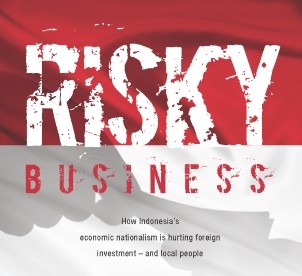Risky Business
Review: Risky Business by Ari Sharp

Title :-Risky Business
By :- Ari Sharp
Published :- Connorcourt; September 2014; Paperback (300 pages)
Outline;- Ari Sharp has recently (September 2014) published a book called “Risky Business” that draws upon his experiences from the copy desk of the Jakarta Globe. This book briefly introduces the recent Indonesian history of investment and provides an outline of the Government apparatus, as seen from the investor’s perspective. The book then gives excellent summaries and observations of recent business events that are original defining cases that contribute to the present assessment of the heightened Country Risk for doing business in Indonesia.
“Riot at the gates” outlines the success of G-Resources gold exploration and construction project in North Sumatra, with the last minute community issue over a waste water pipe. The company had complied with all regulations, and conducted significant community programs. However it was one village that felt left out and distrustful of the local government that has now expanded the industries community engagement risk profile.
“Time to pack your bags” is the story of the head of Exxon Mobile being personally squeezed by the Government to pressure Exxon on the Governments aspiration targets set for annual production.
“Legal Tangles” is the Churchill story of overlapping coal concessions that tests the commitment between joint venture parties, the power plays of competitive Indonesian players the mixed up roll of local government, and the Indonesian legal system. Here the risk to the investor is clear, but it also emphasizes the risk to government of having a free enterprise business sector to contribute to national development.
“Zealous Prosecution” is a review of the Chevron bioremediation event where the Attorney General’s Office and the Anti-Corruption Court change the concepts of civil law into a criminal law situation and thereby altered ongoing perception of legal risk.
“The battle for Mahakam” is another oil industry story, this time for Total. The negotiations for contract extension became a political test case for the ongoing maturing of Indonesian technical capability and rising nationalism over budget realism. This was complicated by internal politics that saw the restructuring of the Government’s management of the oil & gas sector. This event reflects upon the risk factors that rely upon long term certainty for major construction projects.
“A port in a storm” looks at plans to redevelop the Tanjung Priok port and the comparable poor performance of the Indonesian ports. Private plans and even shared private & public plans to reinvigorate the port become frustrated by a dysfunctional government.
“Facing jail for doing business” is the Indosat telecommunications saga that saw accepted business practices be the subject of a determined Attorney General’s Office to develop a new interpretation of the business law, and apply it retrospectively. This event also provides a gimps into the differences between various government institutions.
“Hunger Pangs” lifts the lid on the countries food security outlook, and in particular on the beef industry. It is a typical case of good intentions with poorly defined inspirational legislation, but the lack of serious study results in hurting the people, and providing opportunities for corruption etc. The medaling with quotas etc has added a new level of risk awareness to this industry. The government has learnt about the fundamentals of supply and demand to develop a broader concept of food self sufficiency.
“Bankers Bluff” is about Singapore’s DBS bank good plan to buy Bank Danamon. However international political ambitions of Indonesia to use the deal to lever greater access of Indonesian banks into the Singapore banking market failed, and the deal fell through. So foreign policies can now also affect Country Risk.
“Not ready for the world” is the debacle of the Bumi Resources listing on the London stock exchange in a tie up with Rothschild. This exposed poor Indonesian corporate performance to the world stage and reduced the potential of other Indonesian ventures to raise funds on such markets.
“Caging the Golden Goose” reviews a number of implementing regulations that redefines the application of the 2009 mining law into a political tool to replace a nominal level business playing field into one of aspirational waters. The messy manner of delivering the new rules provides a new level to Country Risk.
Ari Sharp draws a number of conclusions, including looking into the ethos of Indonesia’s leading business groups, the motivations behind government implementation and policy. Ari goes on to make a number of recommendations clearly aimed at the incoming Indonesian Government.
This is a timely book, and easy to read. Apparently it does not yet have a distributer in Indonesia. It contains a number of quotes and a smattering of technical details that would seem to be a useful study guide for university students and the proliferation of guest speakers on endless TV talk shows. The recommendations of this book would seem to coincide with much of Jokowi’s philosophy to bring about a change / improvement in the way of thinking for the Indonesian Government and its institutions that will have meaningful benefit for the larger population.

